This season’s Champions League semi-finals pit two runaway leaders against two sides way off the pace in their respective domestic divisions.
Not many would have placed Bayern Munich in that latter group when the games began back in the summer, but as they prepare to face a Real Madrid team 13 points clear in La Liga and on the brink of winning their 36th Spanish title, they know that a 34th domestic crown of their own is mathematically out of reach, with Bayer Leverkusen already champions and 12 points ahead of them with three games to go.
The Champions League is Bayern’s only remaining hope of silverware this season, as if a final-four clash with 14-times winners Madrid needed any more pressure attached to it. It’s been 12 years since the German side last went trophyless, in which time their semi-final opponents have won five Champions Leagues.
The Athletic previews two meetings of European royalty, beginning in Bavaria on Tuesday night, with reputations on the line.
Arjen Robben celebrates scoring against Madrid for Bayern in April 2012 (Shaun Botterill/Getty Images)
Much like Pep Guardiola of Manchester City in the previous round against Madrid, Bayern coach Thomas Tuchel heads into this two-legged tussle with counter-attacks on his mind.
Bayern have struggled to contain fast breaks against them this season in the Bundesliga, having conceded seven goals shortly after losing the ball in the opposing half. For context, they only allowed 15 shots from such turnovers in 2022-23, with just one of those attempts finding the net.
Tuchel will argue that he saw this coming, stating the need for a “defensive midfielder who holds the position” at the start of the season. He has run into problems with Joshua Kimmich in particular, a player who now looks more settled at right-back, but has struggled more generally to find the right combination of incisive, deep-playing playmaker and powerful duel-winner in the middle of the pitch.
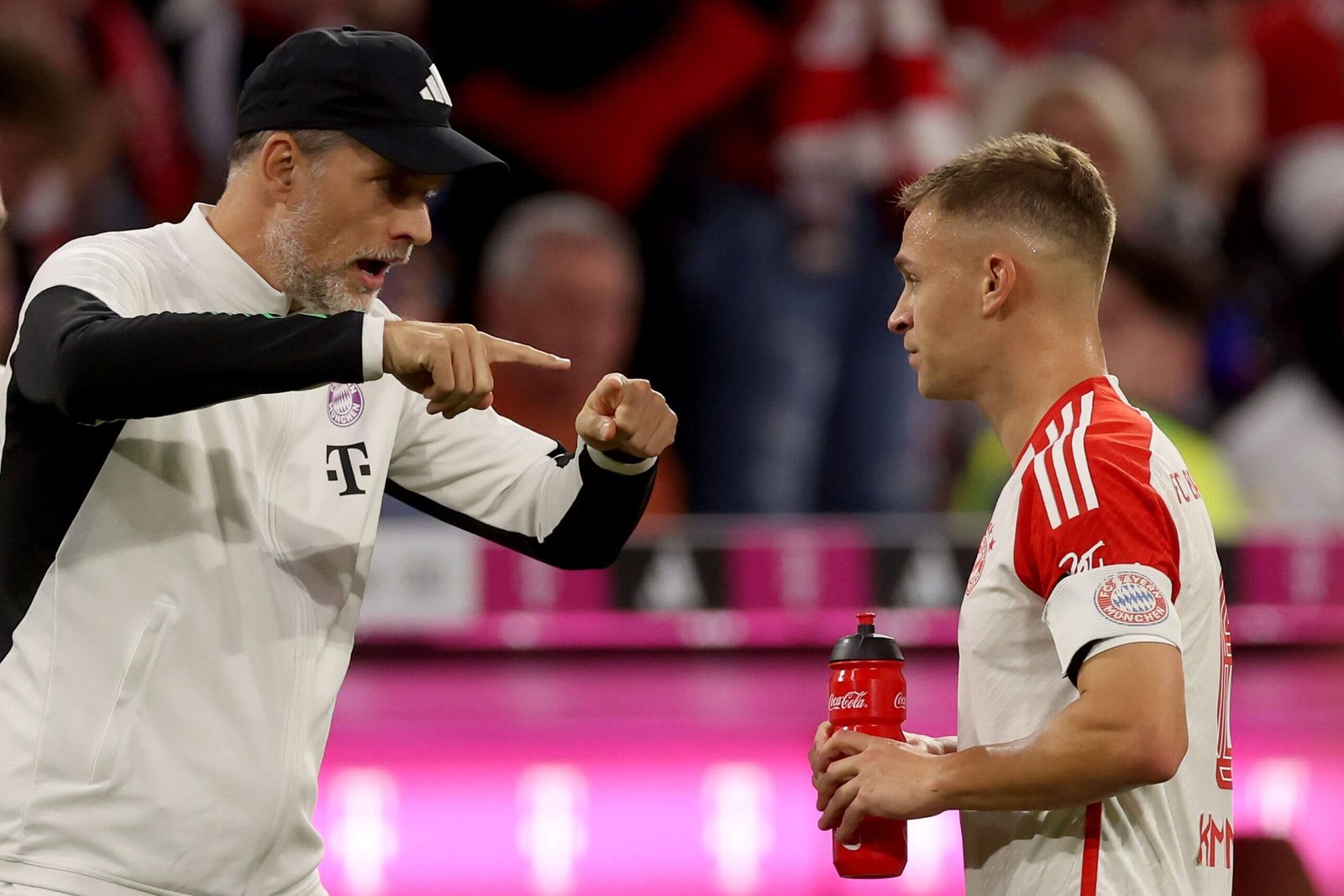
(Alexander Hassenstein/Getty Images)
Far too often, this has led to Bayern dominating possession in games but finding themselves exposed on the transition, particularly when losing the ball in the centre of the pitch.
In this example against Bochum in February, after Jamal Musiala runs into trouble in the final third in frame one, both Leon Goretzka and Kimmich are bypassed swiftly; the former with a quick one-two, the latter after losing out to Anthony Losilla. Frame four shows the result of the weak challenge; a holding duo left back-tracking, unable to protect their defensive line as Takuma Asano is slipped through to score.

Similarly, in a 2-0 home defeat to Borussia Dortmund a month later, it is Konrad Laimer who is slow to react to the turnover in possession.
Thomas Muller gives the ball away this time, and although Laimer jumps forward to apply pressure in the first instance, he is caught ball-watching as Goretzka narrowly misses the interception in the middle, allowing attackers to spin in behind.
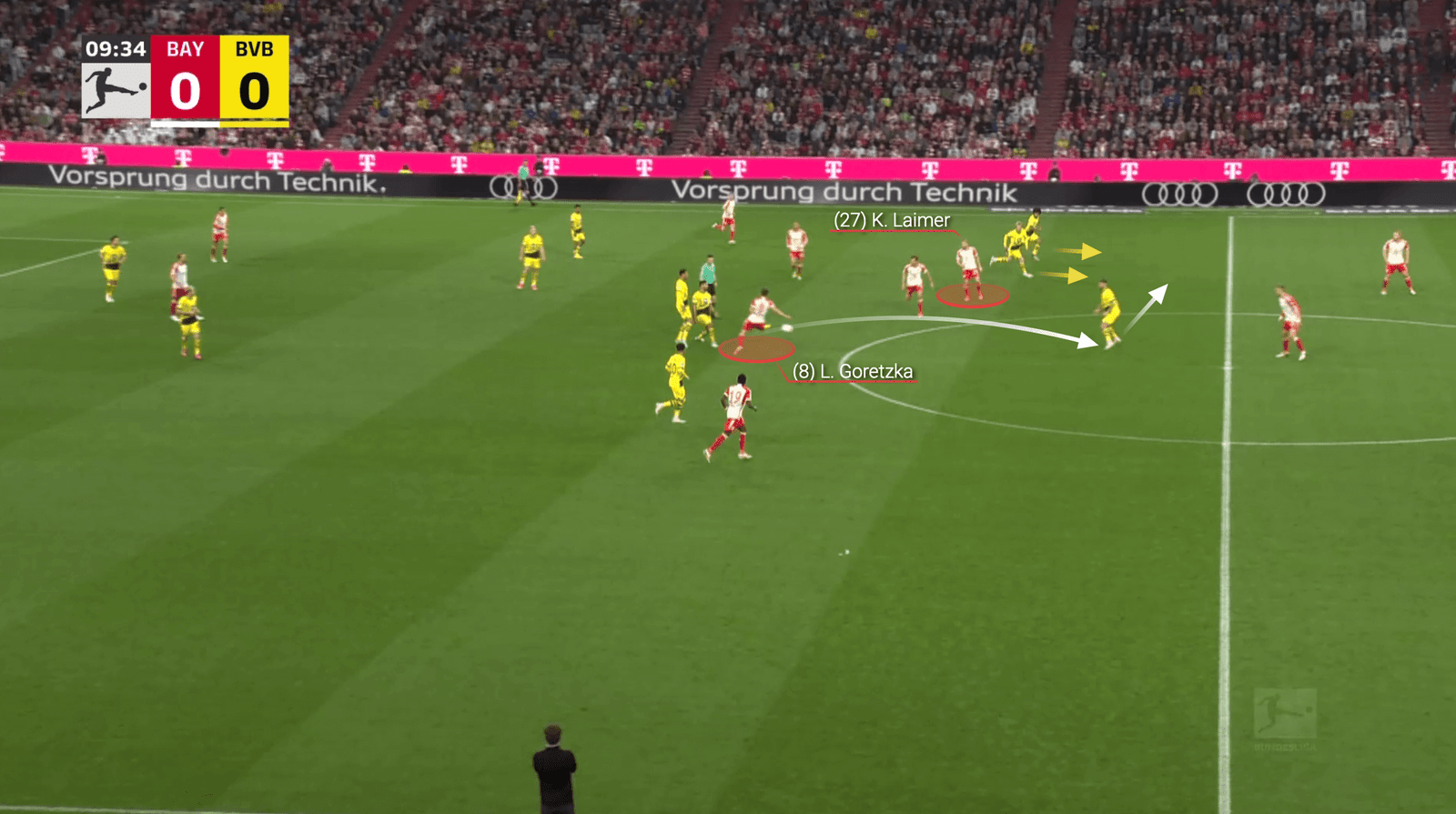
Again, within seconds of a turnover, Goretzka’s aggression is not backed up and the holding duo are left behind. The defence is exposed, and Karim Adeyemi races through to finish.

Conversely, Bayern have looked at their most threatening this season when they have ceded the initiative, including against Arsenal at the Emirates Stadium in the first leg of their quarter-final.
They have won all but one of their Bundesliga games this season when having less than 60 per cent of the ball — scoring eight times on two of those occasions — while five of their defeats in 2023-24 have come when they have controlled over two-thirds of the play and been hit on the break.
This is partly because Bayern have specialist dribbles coming out of their ears. No team in Europe’s ‘big five’ leagues has attempted more take-ons this season, and only one side have a greater success rate — and if Bayern are the ones sitting deep, absorbing pressure, and springing into the open space, rather than the side running into a congested low block, they are much more effective in the final third.
Leroy Sane’s fleet-footed transitions, Musiala’s mazy runs, Serge Gnabry’s two-footed threat, Harry Kane’s ball-striking power; allowing the natural talent to flourish in quick-witted situations often brings out the best in that attacking quartet, without needing to beckon the defensive midfielders forward to help create overloads against stubborn blocks.
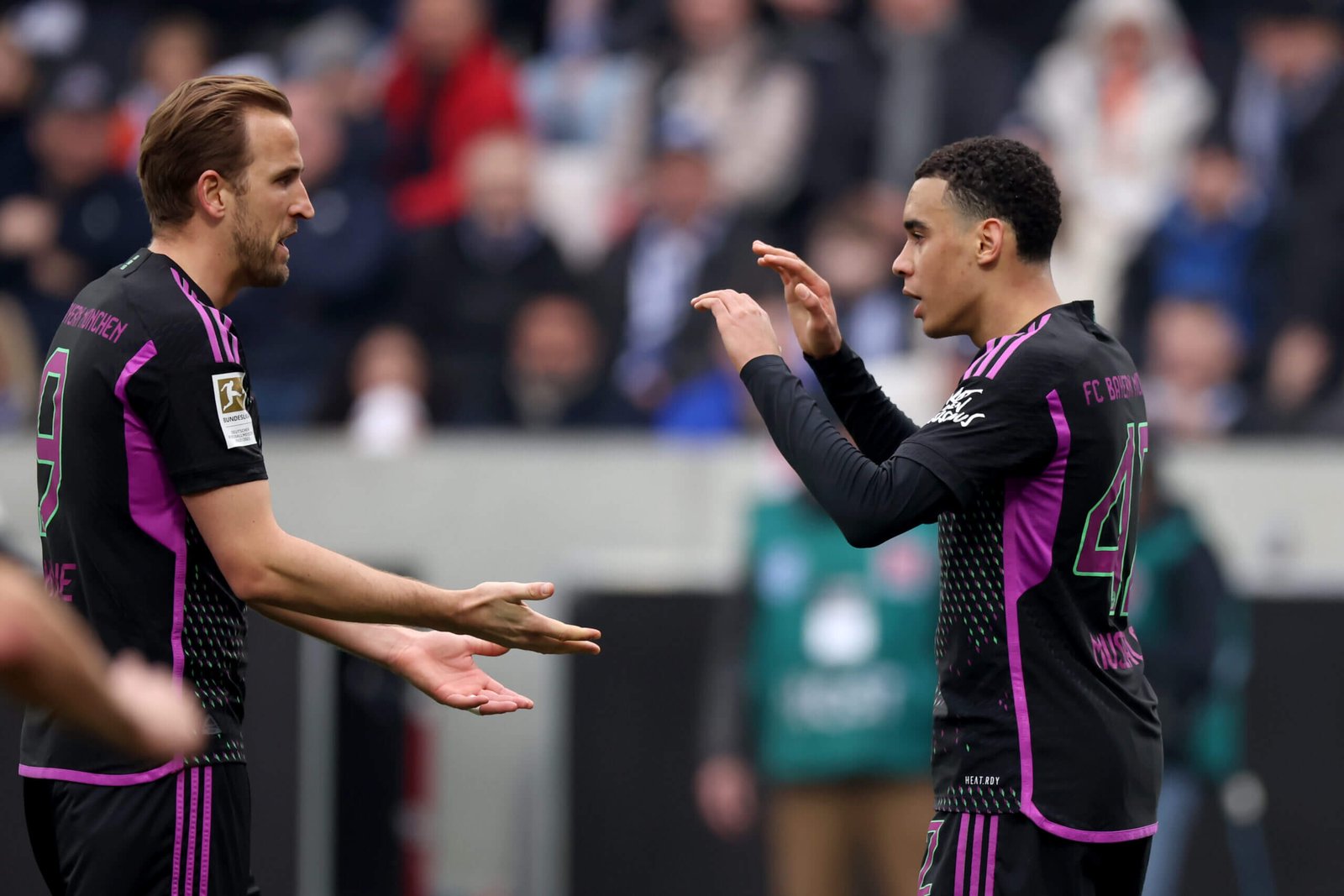
(Alex Grimm/Getty Images)
Pair that with a solid out-of-possession plan — blocking passing lanes, doubling up on dangerous wingers and tightly marking midfield runners as they did against Arsenal – and Bayern can beat anybody, even with a handful of their attacking talents nursing injuries.
The issue is that their opponents in this semi-final won’t really want too much of the ball, either.
Madrid’s “off the cuff” attacking performance in the second leg of their quarter-final against City at the Etihad a fortnight ago was built on rock-solid defensive foundations and quick transitions.
Although extreme in their out-of-possession plan, with Toni Kroos dropping into a back six to pick up City’s roaming No 8s under intense spells of pressure, the forward line was primed to spring into action with every turnover.
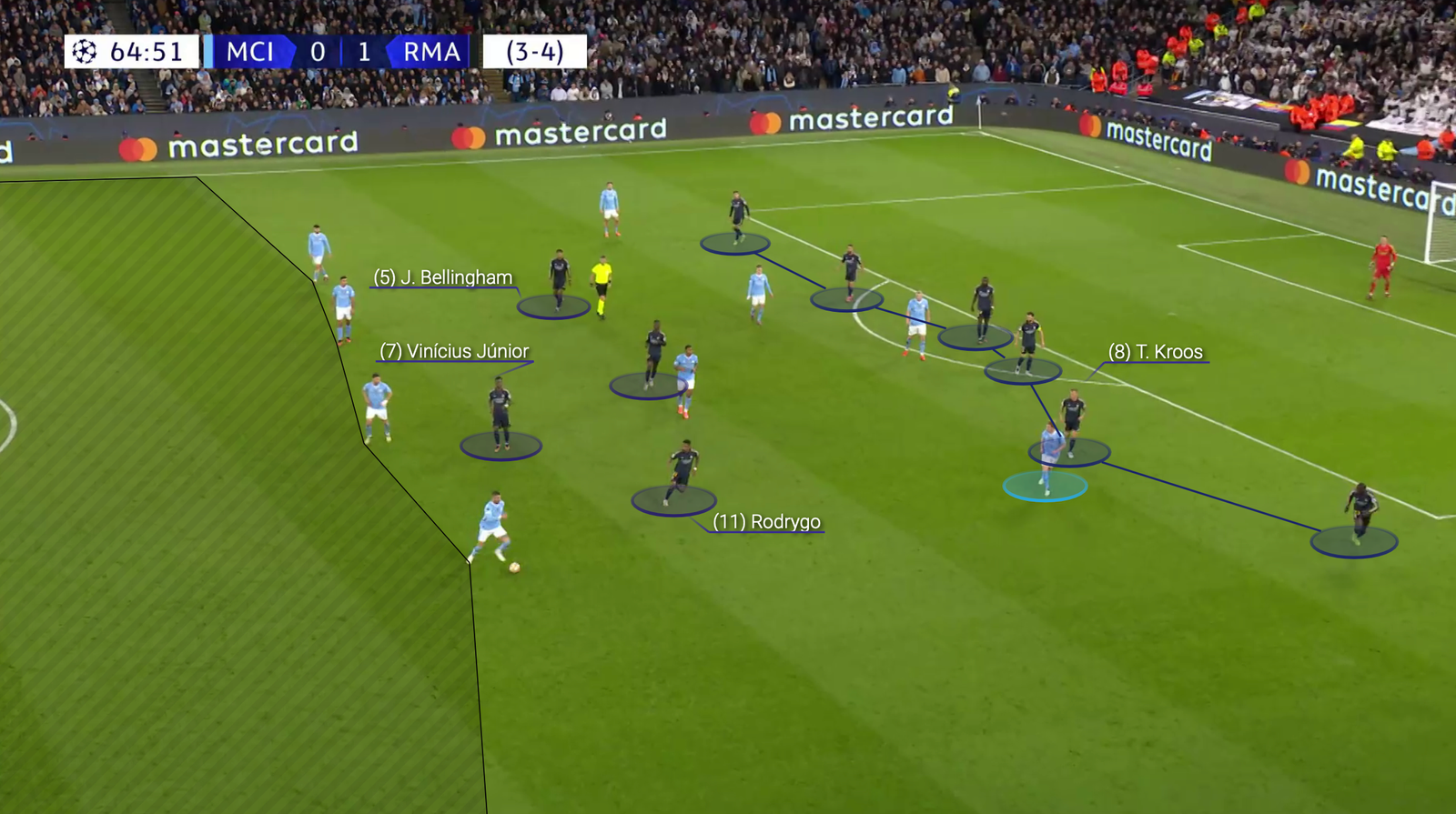
It was in a more open first leg of the tie that Madrid could truly flex their counter-attacking muscles.
The direct and razor-sharp dribbling of both Vinicius Junior and Rodrygo at the top of the pitch allows them to carry attacks by themselves, and there were three examples in a whirlwind first half at the Bernabeu of Madrid having a shot within 20 seconds of a City attempt on goal.
Federico Valverde and Jude Bellingham bring outstanding athleticism and running power to midfield, and are also exceptional duel-winners. That allows Madrid to press from the front with four players who can tear off down the pitch within seconds of nicking the ball, making the La Liga champions-elect an extremely dangerous prospect to play through.

That latter pair can also drop deep alongside the tenacious Eduardo Camavinga, helping Madrid block out the central areas.
No team has a higher true-tackle win rate in La Liga this season — a metric that points to their ball-winning ability — or scored more goals from fast breaks.
Particularly against Bayern, who love to dribble through the block, a midfield packed with robust defenders who can quickly move the ball around and break could be a lucrative route upfield for Madrid.
All of this is not to say that neither side will try to create in this tie with slower, possession build-up, but Tuchel and opposite number Carlo Ancelotti both know their teams are most potent in moments of transition.
That acknowledgement should lead to relatively even games in terms of possession, with both sides tentative to over-commit with the ball, only clicking into top gear when they sense an opportunity to gallop into space.
For Bayern, that space is likely to come from luring Madrid in, creating an artificial transition that the talented ball-carriers can exploit. Bayern’s skill in this department was on show at the Emirates, where goalkeeper Manuel Neuer’s unerring confidence in possession saw him flick the ball up and volley over Kai Havertz in the build-up to their second goal in that 2-2 draw.
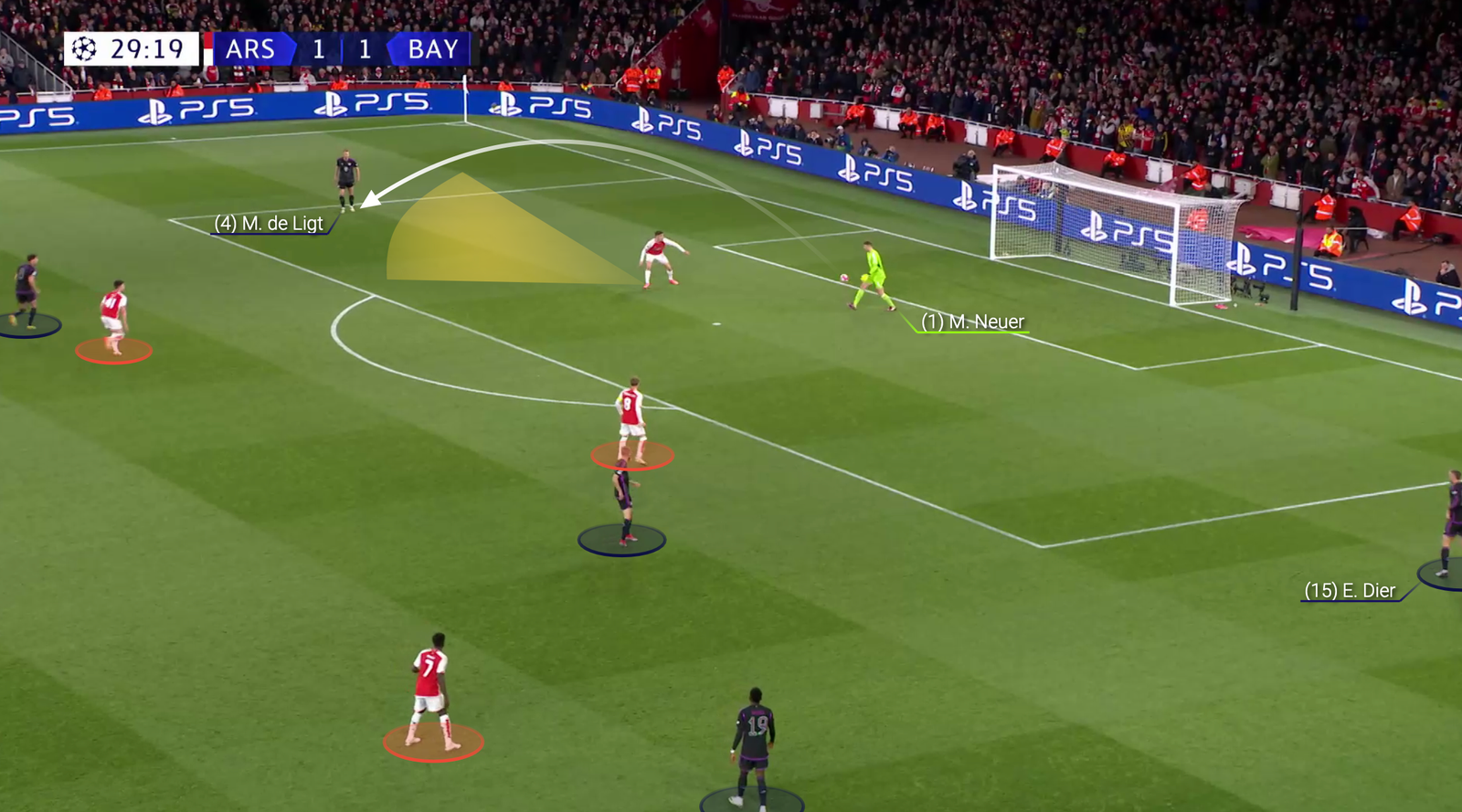
With Arsenal clearly trying to force the ball towards centre-back Eric Dier on the visitors’ left, confidence close to their own goal gives Bayern a route down their right instead, where Sane’s individual brilliance invariably sees him spin away and into space.
Madrid are not particularly comfortable with pressing high, and have often allowed space for the opposition to progress through. If Bayern can tempt them out of their compact mid-block, they possess the quality to attack those areas.
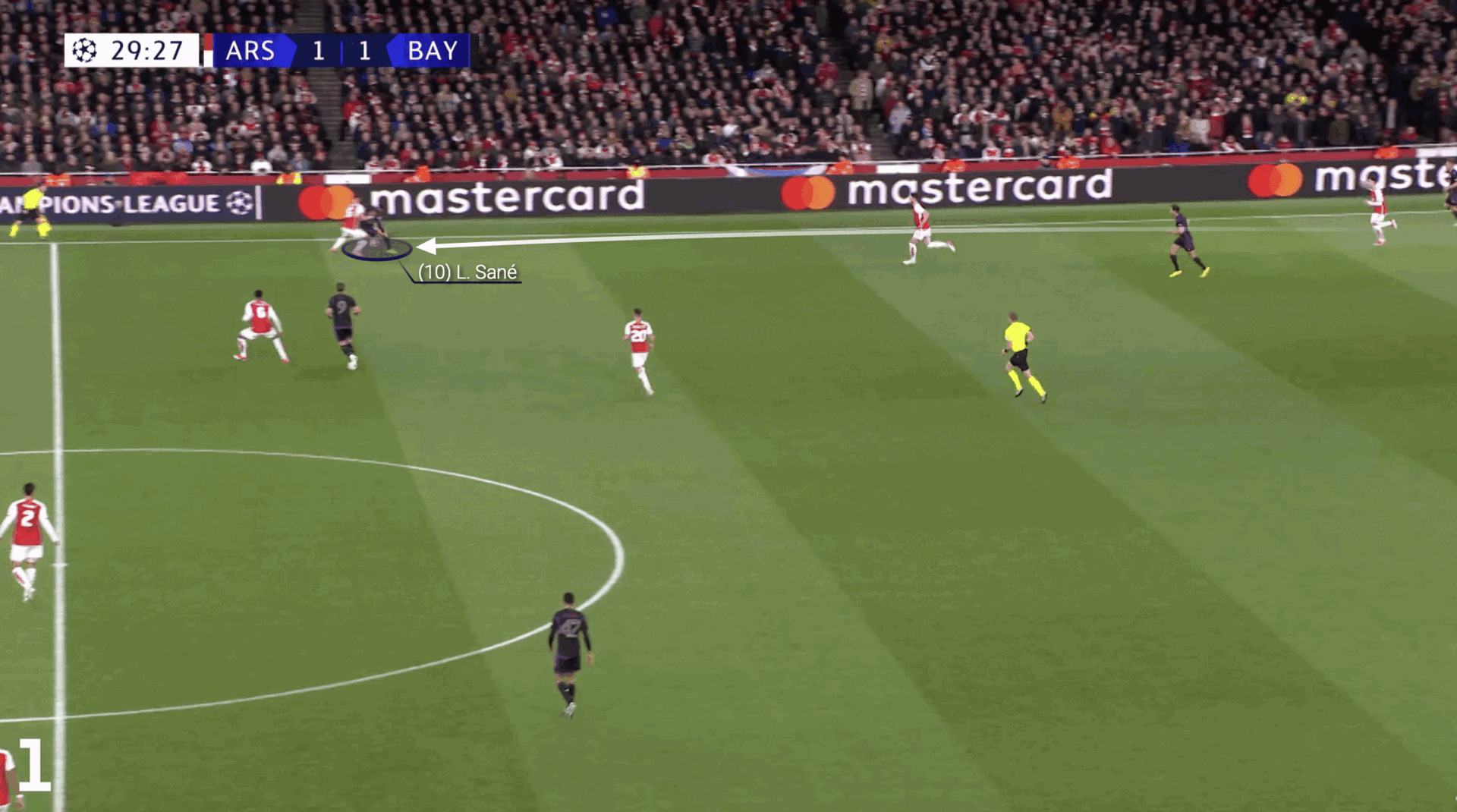
For Madrid, long-range shots could play an important role if they encounter a risk-averse Bayern side. Only Rayo Vallecano (192) have taken more shots from outside the box than Ancelotti’s side this season (191), while no La Liga team have scored more than their 11 long-range goals. Valverde and Kroos are particularly skilled from distance, but both Luka Modric and Aurelien Tchouameni have settled tight contests with Sevilla and Mallorca respectively this season with goals from beyond the penalty area.
Madrid also rotated heavily against Real Sociedad at the weekend, making nine changes from their all-but title-clinching win over Barcelona the previous Sunday. Bellingham, Kroos and Rodrygo all got the day off, while Vinicius Jr, Valverde and Camavinga came on for 15 to 20 minutes each.
As ever with games involving Ancelotti’s Madrid, moments of individual inspiration can blow this contest apart.

Despite contrasting domestic campaigns to date, this historic and heavyweight rivalry will be as closely-contested as ever.
These current iterations of Bayern and Madrid are not flawless but that should make for a fascinating contest.
(Top photos: Getty Images)
Read the full article here


